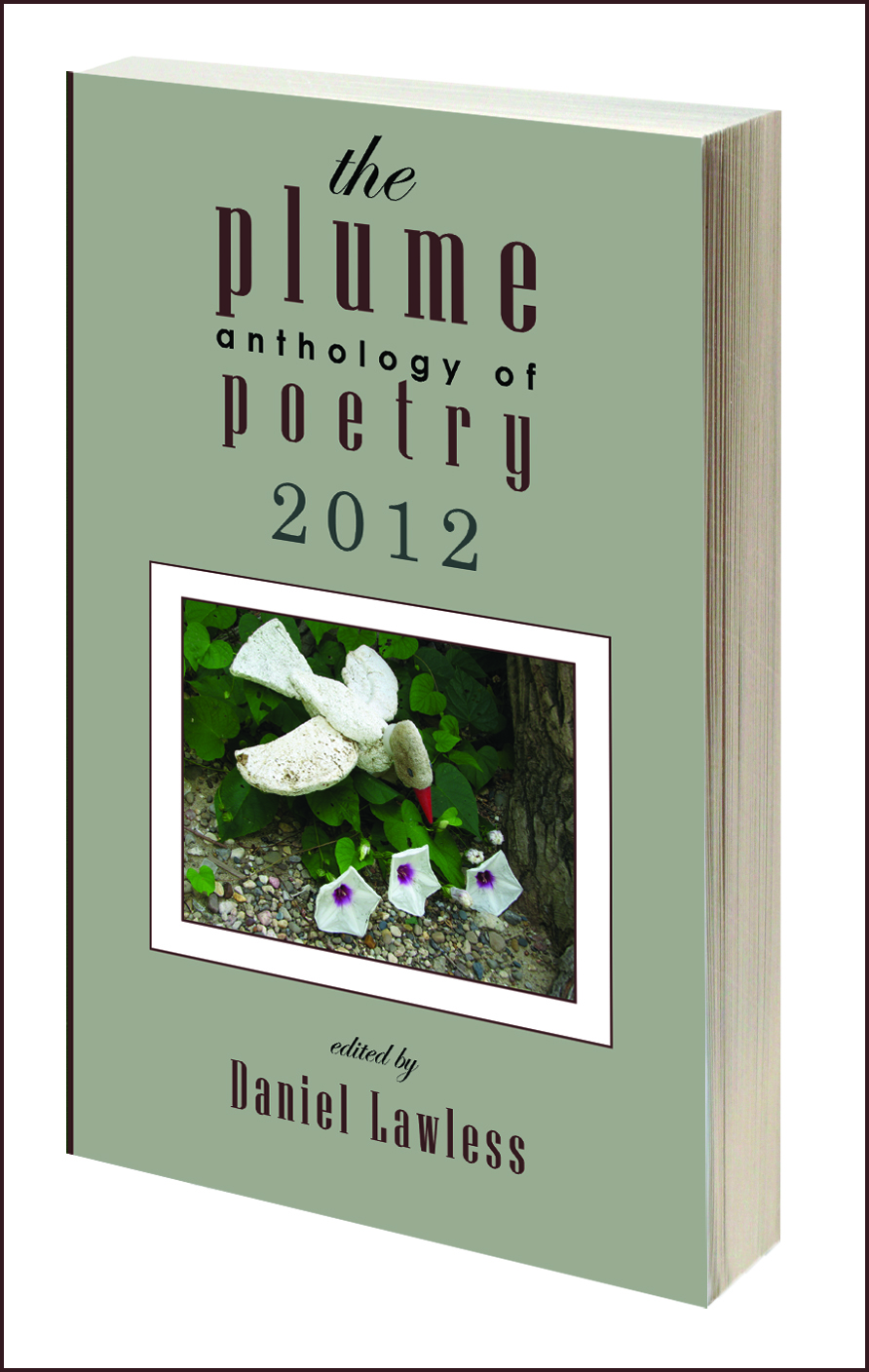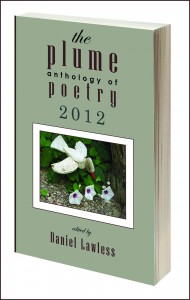
The Plume Anthology of Poetry – 2012: A morning market of great writing
Uncategorized September 21, 2012
 The Plume Anthology of Poetry – 2012
The Plume Anthology of Poetry – 2012
Ed. by Daniel Lawless. Pequod Books. $16.00
Anthologies can present us with the usual buffet of poems, but reading the new anthology from Plume is like walking through a vibrant downtown street market, the smell of grilled onions in the air, a fresh cup of coffee in one hand, a basket ready to be filled in the other. Plume is an online monthly journal, founded by St. Petersburg College professor Daniel Lawless, that uses an eye-pleasing gray background, a tint that makes it more suitable to read than the blaring white used nearly everywhere online. Until I experienced this soothing tone I never noticed the harshness of the white, and the cover of this new print anthology utilizes the same pleasing color. Plume, the online magazine, offers twelve poems every other month, and this anthology, from Pequod Books, with unique cover art from Mr. Al Gorman, is a perfectly seasoned collection of the first six journals, and includes a bonus dozen featured poems from the Dutch poet M. Vasalis. This new anthology stimulates the senses as much as a stroll through a morning market of international spices, domestic vegetables, and foods from all over the globe.
This wonderful collection offered me the opportunity to ‘taste’ new work from poets I’m familiar with, and expose my senses to those I’m not. At this ‘fresh market’ I strolled past and sampled from both. A poem from Dorianne Laux opens the book with, appropriately, her poem “Plume”:
And somewhere beyond the field, a poet sits
alone in her flimsy house, her pen squeaking
across a blank page, writing the screed
of her life, making her little path of words
and thoughts….
It’s no accident that Mr. Lawless placed this poem – custom-written for the magazine by an American master at the height of her craft – at the beginning of the book. What better way to draw me in, to get me to enter the market, turn the page? Laux has published extensively, even co-wrote a poetry manual with the as talented Kim Addonizio, and having Laux’s poem on the first page is as if the editor put up the perfect booth at the anchor corner. Allow Plume to lead you down the row, turn the corner…here’s a sparse poem from Pulitzer Prize winner Rae Armantrout. Next up, stop and visit the booth of Tampa Bay treasure Peter Meinke. Marvel at how he finishes his poem “A Fable: The Floss-Silk Tree and the Philodendron”:
For what’s love but recognizing beauty
as a temporary gift and strangling it
against all odds?”
Ahh, Peter, you never fail to turn a memorable phrase. Keep walking, and the basket starts to fill with poems of weight, poems of light. As Lawless makes clear in his Introduction, it’s the poem, not the poet’s reputation, that affords it a place in Plume. I’ve often read poems in magazines and books (which will go unnamed) and shook my head, sure the poem I just tried to enjoy was published due to the writer’s name. Not so here.
Marilyn Hacker deftly brings out the English in Claire Malroux’s French prose poem “Poems for the Absent One,” giving me yet another European poet to explore. I’ve spent many mornings deep in the woven stillness of Tomas Tranströmer, Rainer Maria Rilke, Rolf Jacobsen, and Juan Ramón Jiménez, and the anthology from Plume has given me well-marked trailheads to hike into the mountains of translated poetry. With a basket beginning to fill, I came across the glass-clear translations from David Young and Fred Lessing of a dozen poems from Margaretha Drooglever-Fortuyn-Leenmans (1909-1998), a Dutch pediatric psychiatrist (whom I surmise corresponded with Swiss child psychologist Alice Miller) that wrote under the pseudonym of M. Vasalis. Although a plume can be defined as a large, showy feather, this poetry from Vasalis is as unassuming as writing can be. Her silent strength shines from every line. Witness her four-line poem “Old Age”:
I practice like a young bird on the edge
of the nest I must soon forsake
in little faltering flights
and open my beak.
It’s a poem that deserves numerous readings, allowing Vasalis’s images to bake and rise in the imagination. Superb. Her poems are the feature in this publication, and, to my distinct pleasure, an online search for a volume of her poems showed me the twelve in this anthology is the largest collection of her poems in English. Her sensitivities would match up well with those of the Dutch diarist Etty Hillesum, and Vasalis could easily be called Holland’s answer to Emily Dickinson. Perhaps Messrs. Young and Lessing will devote some of their time and talent to bring forth more of her work. We could only hope. Hans Borli, Lars Gustaffson – move over and let Vasalis sit with you on the well-weathered bench. Poems like hers make me want to stop writing and begin again. Hear the timbered sound/no sound at the end of Vasalis’s “To Verse”:
…and then it’s the way it is in a dream,
when you really need to scream
and no sound will come out.
In this treasure chest anthology, I filled my basket with poems and prose poems translated from the Macedonian, Czech, Dutch, German, French, and Chinese, all with the original text, and there’s the Spanish “Ars Poetica” of Peruvian poet Eduardo Chirinos translated into English for us by G.J. Racz. My eyes fluttered from the visual treat of the original Macedonian and Chinese text. Nin Andrews’s prose poem is as well crafted as they come, and I can now count the uber prose poem from Denise Duhamel as an all-time favorite.
My copies of Linda Pastan’s books are heavily underlined and dog-eared, and I was thrilled (but not surprised) to find one of her new poems here, sure to be in her next collection. A Pastan in a journal is, to me, like a van Gogh in a museum. From “Late in October”:
Perhaps beauty
is the mother of death,
not the other way around.
Perhaps the rain itself
is an answer: knives
of crystal, cleansing
and killing as it falls.
I turn from the window;
winter is coming next.
White will have
it own perfections.
A political poem (how fitting for this 2012 election season) from Martha Collins follows Pastan, then comes Stuart Friebert’s translation of the German poet Kuno Raeber, Daniel Bosch, Alicia Ostriker, Bob Hicok, Paul Muldoon, Thomas Lux…I ask, how much more of a good thing can Lawless fit into one book?
On these pages I find Robin Behn’s much-needed poem “Here at the Scene.” It stands as a fitting memorial to the deceased former University of Massachusetts professor and poet Deborah Digges, the author of one of this year’s must-read collections The Wind Blows Through the Doors of My Heart. The Plume anthology’s binding bulges with poems from Pulitzer Prize, National Book Award, and National Book Critics Circle Award winners, published next to poems from writers of little (as yet) acclaim. I’ll cover up the names at the top of the page the next time I read through these poems. And I will be reading them again.
The index of a well-researched book can lead to more good reading, and the bios of the contributors at the back of Plume‘s anthology will serve me as a poetic depth finder. With this display of craft, this journal stands to be healthy for years to come, and this anthology is sure to be the first of many annual treats Lawless will make available. It can raise its head high as a compilation of writers worth our time, and the list of contributors at the end of this book can be used as a pathway leading to hours of great reading.
Looking at the website for Plume shows me that the talent continues to pour in submissions of great poetry, and the new issues (which will surely appear in their 2013 anthology) include writing from the likes of Billy Collins, Addonizio, Carl Phillips, Marianne Boruch, Sharon Olds, David Kirby, Jorie Graham, Georg Trakl….
Menschens kind! I’ll need another basket.
Available now at their website, Amazon, and Barnes & Noble.
